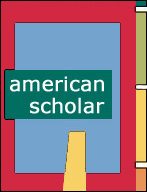English 5599 - Creative Writing For Teachers
How Do I Instruct Without Intruding?
I have likened my journal during this course to a jungle gym. Since my final portfolio will contain some of my work during the course of the semester, it would seem to an outsider that it is nothing more than a motley collection of random thoughts and questions.
One journal entry in particular, the one about a trip to the coffee shop, sparked an idea into the first chapter in a book. I now have four chapters of my first novel written (or partially written) thanks to the time spent with the weekly prompts. I have also learned a lot about an inner voice that has lain dormant for these many years of writing research and technical documents. This latent self has emerged and will not go back down without a fight.
One of my main struggles will be to decide what seven works to choose for my final portfolio. All of them are works in progress, so it won't be a matter of which ones are the most polished. I suppose I could include those that have been most instrumental in my discovery of new ideas.
I continue to wrestle with how exactly creative writing should be implemented into the classroom. Should it be a catalyst for further exploration on certain subjects? Or should it be the subject at hand? Would it be best to assign students to write freely in a journal during certain portions of the class period? Do I grade the journal for length? Content? I will answer these questions when the time comes. I just hope my answer is reasonable.
One particular concern regarding this matter focuses on a strain of conversation in this week's online discussion. It began from a comment K-- made about the importance of teacher response to student work. K-- made the assumption (as I would have and still do) that students need "timely feedback." I would not have thought twice about the comment until Dr. T-- questioned its validity. Is it only so because of tradition and conditioning? So the question must be asked, (as Dr. T-- does so), "Isn't the purpose of writing as we're talking about here in this class, as a tool for the pursuit of knowledge, a personal activity that does not require teacher response?" The answer may be "No," but what about the teacher's responsibility to keep the student accountable during this pursuit of knowledge? Will most students work well unassisted? There is no easy solution to this dilemma, but Dr. T-- raises a good point: Giving the student the illusion that there is always someone watching our every move in real life with all the answers is destructive. How does this build a scholar's identity and sense of worth?
So I do validate the use of Creative Writing in the classroom. But I must think through my method of implementation for these reasons. This is what I will be working on from now until I turn in my final portfolio.
